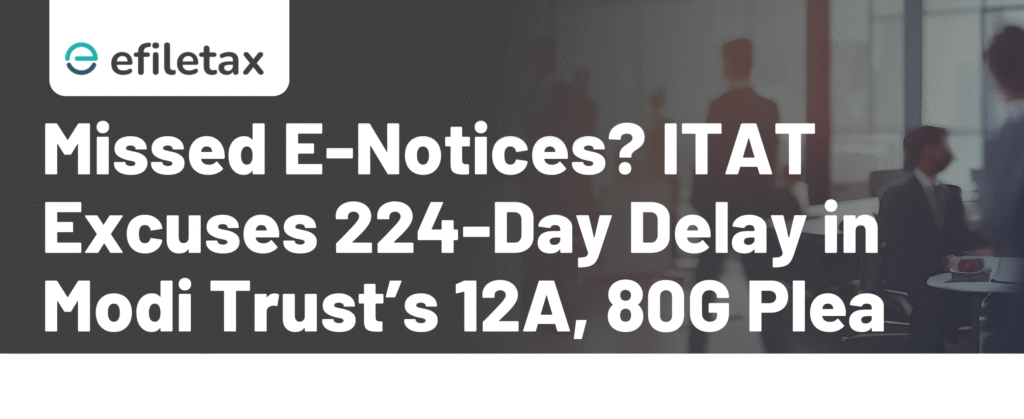
ITAT Condones 224-Day Delay Modi Charitable Trust’s 12A & 80G Applications Remanded Over Unfamiliarity with E-Notices
In a notable judgment, the Income Tax Appellate Tribunal (ITAT) has condoned a 224-day delay in filing an appeal by Modi Charitable Trust, citing the assessee’s lack of familiarity with the Income Tax Department’s e-filing portal and e-notices. The case pertains to rejection of registration under Section 12A and approval under Section 80G of the Income-tax Act, 1961.
This blog simplifies the legal nuances and explains how this ruling impacts charitable trusts and tax-exempt institutions across India.
Background: What Triggered the Dispute?
- Applicant: Modi Charitable Trust
- Application: For registration under Section 12A and approval under Section 80G
- Order by CIT(E): Application rejected due to non-compliance with e-notices
- Delay: 224 days in filing appeal before ITAT
What Did the ITAT Say?
The Delhi Bench of ITAT observed:
- The trust did not check or operate the e-filing portal regularly
- Notices under e-Proceedings module went unnoticed, leading to no response
- Trust had no mala fide intent; it acted promptly once it became aware
- Condonation of delay granted on grounds of reasonable cause under Section 253(5)
🔍 Legal Reference:
- Section 253(5) of the Income-tax Act allows ITAT to admit delayed appeals if there’s sufficient cause.
- The Tribunal referred to principles of natural justice and substantial justice over procedural delay.
Why This Matters to Other Trusts and NGOs
If you’re a charitable trust or Section 8 company, this ruling offers important lessons:
Check the e-filing portal regularly
Notices under the Faceless Regime are only issued digitally. No physical intimation is sent.
Ignorance is not always penalized
ITAT recognized that non-professional trusts may not be tech-savvy.
Procedural lapses aren’t always fatal
As long as the core intent is non-malicious, tribunals may condone procedural delays.
How E-Notices Work: Quick Guide
| Point | Details |
|---|---|
| Mode of Notice | Uploaded on www.incometax.gov.in under e-Proceedings tab |
| No Physical Copies | Notices are not sent by post |
| Response Time | Typically 7–15 days from issue date |
| Default Risk | Ignoring notices can lead to rejection of applications, penalties, or ex-parte orders |
Expert View: Digital Compliance is the New Normal
“This case highlights the critical need for digital awareness among small NGOs and religious trusts. At Efiletax, we always recommend setting up email + SMS alerts and checking your portal login once a week.”
— Tax Compliance Lead, Efiletax.in
FAQs: ITAT Condonation & Charitable Trusts
Q1. Can ITAT always condone delays?
Yes, under Section 253(5), ITAT can condone a delay if there is sufficient cause.
Q2. Will I get physical notices for Section 12A/80G applications?
No. Post-CPC reforms, all communication is electronic via the income tax portal.
Q3. What happens if I miss an e-notice?
You may lose your registration opportunity or get orders passed without your say.
Q4. How do I prevent this?
- Set portal alerts
- Hire a compliance consultant
- Check the portal at least once a week
Final Takeaway
The ITAT condones delay in Modi Charitable Trust’s case is a reminder that while digitization improves transparency, digital illiteracy can hurt your compliance status. If you’re managing a trust, always keep your portal activity on track.
Get Expert Help for Trust Registrations & Appeals
Avoid costly mistakes. Let Efiletax handle your Section 12A / 80G filings, appeal support, and compliance monitoring.
👉 Book your free consultation now
Summary
ITAT condoned a 224-day delay in Modi Charitable Trust’s appeal under Sections 12A and 80G, citing unfamiliarity with e-notices. The case underscores the need for digital compliance by charitable trusts. Trusts must regularly check the e-filing portal to avoid procedural setbacks.